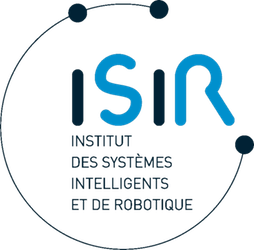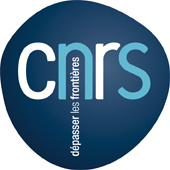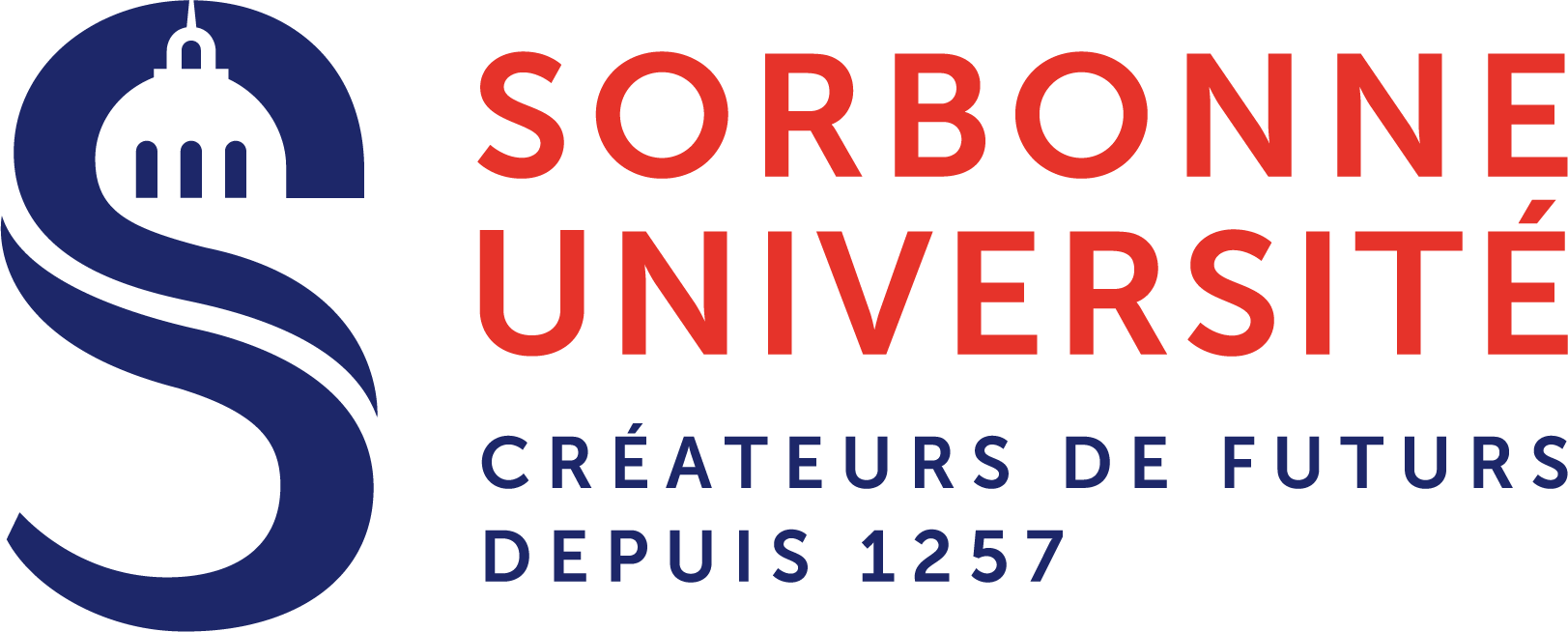Last week, we participated in the Eurohaptics 2024 conference held in Lille, France.
👉 Event website : https://eurohaptics.org/ehc2024/
An opportunity for us to explore the latest tactile and haptic technologies, and discuss the latest publications with other researchers in the field.
🏆 Thomas Daunizeau, former doctoral student at ISIR – Institut des Systèmes Intelligents et de Robotique and member of HCI Sorbonne returned with the award for best thesis !
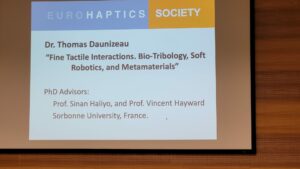
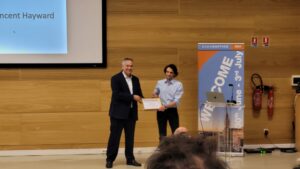
We had a wonderful time and we hope to meet you at the next edition !
Abstract: Navigation is complex cognitive process that recruits perceptual cognitive and affective processes. Pedestrian navigation is particularly interesting because our choices have clear physical implications (effort, exposure to different environments, etc), as well as broader efforts to increase active mobility (mobilités douces) world-wide. In this presentations I will present three different projects explore cognitive and collaborative dimensions of urban pedestrian mobility, drawing from the following works:
The paraCHI event was held on 16-17 May in Paris at the Inria Paris Research center. Solene Lambert, a member of HCI Sorbonne, lead the organisation of a very successful event.
👉 Event website : https://lnkd.in/etHj2XAk
HCI researchers met for a two-day mini-conference on hashtagCHI2024 as part of the para.chi initiative.
The objective was to present the papers accepted for CHI in person, to view and discuss in groups the videos of the paper presentations, keynotes and lifetimes awards, and to hold a round table to collectively reflect on the format of the hub for CHI or other HCI conferences.
Solene Lambert and Julien Gori, both researchers at ISIR – Institut des Systèmes Intelligents et de Robotique and members of HCI Sorbonne gave a stirring presentation of their work published in hashtagCHI2024.
The event was made possible thanks to our partners : AFIHM, Inria and PEPR eNSEMBLE1716408461540
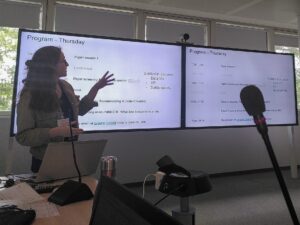
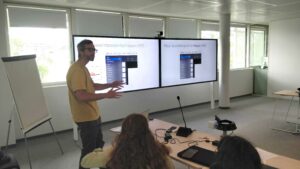
We have two papers accepted at the ACM conference on Intelligent User Interfaces (IUI). The two papers addresses investigates interactive machine teaching in two different context: 1) the use interactive machine teaching for arm prosethesis personalisation; 2) the collaborative strategies in interactive machine teaching.
Vaynee Sungeelee, Nathanaël Jarrassé, Téo Sanchez, Baptiste Caramiaux. Comparing Teaching Strategies of a Machine Learning-based Prosthetic Arm. ACM IUI, 2024
Abstract: Pattern-recognition-based arm prostheses rely on recognizing muscle activation to trigger movements. The effectiveness of this approach depends not only on the performance of the machine learner but also on the user’s understanding of its recognition capabilities, allowing them to adapt and work around recognition failures. We investigate how different model training strategies to select gesture classes and record respective muscle contractions impact model accuracy and user comprehension. We report on a lab experiment where participants performed hand gestures to train a classifier under three conditions: (1) the system cues gesture classes randomly (control), (2) the user selects gesture classes (teacher-led), (3) the system queries gesture classes based on their separability (learner-led). After training, we compare the models’ accuracy and test participants’ predictive understanding of the prosthesis’ behavior. We found that teacher-led and learner-led strategies yield faster and greater performance increases, respectively. Combining two evaluation methods, we found that participants developed a more accurate mental model when the system queried the least separable gesture class (learner-led). Our results conclude that, in the context of machine learning-based myoelectric prosthesis control, guiding the user to focus on class separability during training can improve recognition performances and support users’ mental models about the system’s behavior. We discuss our results in light of several research fields : myoelectric prosthesis control, motor learning, human-robot interaction, and interactive machine teaching.
Behnoosh Mohammadzadeh, Jules Françoise, Michèle Gouiffès, Baptiste Caramiaux. Studying Collaborative Interactive Machine Teaching in Image Classification. ACM IUI, 2024
Abstract: While human-centered approaches to machine learning explore various human roles within the interaction loop, the notion of Interactive Machine Teaching (IMT) emerged with a focus on leveraging the teaching skills of humans as a teacher to build machine learning systems. However, most systems and studies are devoted to single users. In this article, we study collaborative interactive machine teaching in the context of image classification to analyze how people can structure the teaching process collectively and to understand their experience. Our contributions are threefold. First, we developed a web application called TeachTOK that enables groups of users to curate data and train a model together incrementally. Second, we conducted a study in which ten participants were divided into three teams that competed to build an image classifier in nine days. Qualitative results of participants’ discussions in focus groups reveal the emergence of collaboration patterns in the machine teaching task, how collaboration helps revise teaching strategies and participants’ reflections on their interaction with the TeachTOK application. From these findings we provide implications for the design of more interactive, collaborative and participatory machine learning-based systems.
We are thrilled to announce that the HCI Sorbonne group will present 2 posters, 5 demos and 3 papers at IHM2024.
Papers
Étude de l’impact des sensibilités sensorielles visuelles et haptiques sur la détection d’illusions visuo-haptiques en réalité virtuelle. Flavien Lebrun, Gilles Bailly, Sinan Haliyo, Malika Auvray, David Gueorguiev.
Effets des aptitudes visuo-spatiales sur l’apprentissage par la réalité virtuelle. Eya Jaafar, Philippe Gauthier, Geoffroy Canlorbe, Ignacio Avellino. https://hal.science/hal-04454386v1
Comprendre et générer des distributions de commandes réalistes. Julien Gori, Mohamed Ali Ben Amara, Gilles Bailly. https://hal.science/IHM-2024/hal-04451461
Posters (Late Breaking Work)
Understanding remote endoscope control in surgical telementoring. Océane Lelièvre.
Using live tags for summarizing surgical videos collaboratively. Alexandre Haddad.
Demos (https://hal.science/hal-04500046v1)
Surgical Cockpit. Océane Lelièvre.
Co-creation of musical interfaces for children with Autistic Spectrum Disorder (ASD). Théo Jourdan, Baptiste Caramiaux.
Boîte à outils pour les illusions visuo-haptiques. Benoit Geslain, Bruno Jartoux, Flavien Lebrun et Gilles Bailly.
TeachTOK: Système d’Apprentissage Automatique Interactif et Collaboratif pour d’un Classifieur d’Images. Behnoosh Mohammadzadeh, Jules Françoise, Michèle Gouiffès, Baptiste Caramiaux.
Peroscope. Alexandre Haddad.
We have the pleasure to announce that Eya Jaafar has received the 2023 award for innovation in pedagogy from the French Academy of Surgery – Prix de l’Innovation Pédagogique 2023 de l’Academie de Chirurgie.
Congratulations!
https://www.academie-chirurgie.fr/les-laureats
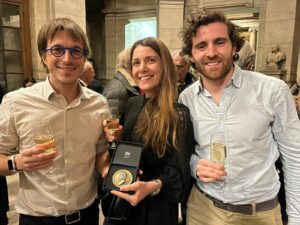
Who: Cedric Honnet (MIT Media Lab)
When: May 25, 11:00AM
Where: ISIR Lab, H20
Title: Sensitive Human-Computer Interactions
Abstract: This talk will be about 3 open source sensing devices and wearable projects:
– PolySense: Augmenting Textiles with Electrical Functionality using In-Situ Polymerization
– MetaSense: Integrating Sensing Capabilities into Mechanical Metamaterial.
In France, the Habilitation is a step in the research career of junior/intermediate researchers. It gives candidates the right to direct a doctoral thesis independently (instead of co-directions only). It also allows them to apply for higher-rank positions such as full professor or research director positions.
On May 15th, 2023, Baptiste Caramiaux has defended his Habilitation, covering ten years of research and supervision. The Habilitation is called “Machine Learning in Interaction: Tool, Material, Culture“.
The defence has been recorded and can be watched on YouTube: https://youtube.com/live/O9wfzKIa8ic
Summary
In this habilitation, I emphasise the importance of a perspective on machine learning (and artificial intelligence) technologies situated in interactions with people and contexts of development and use. Through my research over the past ten years, in collaboration with my students, post-docs, and colleagues, I articulate three perspectives: machine learning as a tool, material, and culture. First, I show that machine learning can be seen as a tool acting on objects situated in their context. This view has several limitations, which are highlighted in creative applications. Secondly, I show that machine learning has materiality, useful for system design. This materiality makes the technology dynamic and expressive, highlighting its cultural dimension developed in the third part. As a culture, I show that this technology is often communicated in a normative way, reducing the possibilities of discourse and interaction. And I propose examples of alternative discourses on technology from artistic works. In conclusion, I discuss the interrelationships between these three perspectives and how they can be linked in a human-computer interaction research programme.
Jury
– Susanne Bødker, Professor, Aarhus University (Reviewer)
– Elisa Giaccardi, Professor, Delft University of Technology (Reviewer)
– Myriam Lewkowicz, Professor, Université de Troyes (Reviewer)
– Alex Taylor, Reader, City University of London (Examiner)
– Rebecca Fiebrink, Professor, University of the Arts London (Examiner)
– Jean-Daniel Fekete, Director of Research, Inria (Examiner)
website of the PEPR ENSEMBLE: http://pepr-ensemble.fr
- Announcement of the priority themes – 27 March 2023
- Submission of Ph.D. projects – 11 April, 2023
- Pre-selection of candidates – 12 May, 2023
- Candidates interviews – 1-2 June, 2023
- Start of the Ph.D. program – October – December 2023
The HCI Sorbonne group have presenteed three papers at the French conference in Human-Computer Interacion (IHM’23 https://ihm2023.afihm.org):
- Sungeelee, Loriette, Sigaud, Caramiaux. Co-Apprentissage Humain-Machine: Cas d’Étude en Acquisition de Compétences Motrices. IHM’23, article
https://hal.science/IHM-2023/hal-04014981v1 - Ferrier-Barbut, Avellino, Vitrani, Canlorbe. Les Visiocasques dans la Formation et la Planification Chirurgicales : Une Revue de la Littérature. IHM’23, article
https://hal.science/IHM-2023/hal-04019531v1 - Rigaud, Bailly, Jansen. Ressources de connaissances dans les ateliers de fabrication: objectifs et défis. IHM’23, article
https://hal.science/IHM-2023/hal-04014973v1
And we demoed Marcelle, an open-source toolkit for building interfaces and applications with machine learning:
- Françoise, Caramiaux. Marcelle : un toolkit pour la conception d’interactions humain-apprentissage automatique. IHM’23, démo
https://hal.science/IHM-2023/hal-04043369v1
